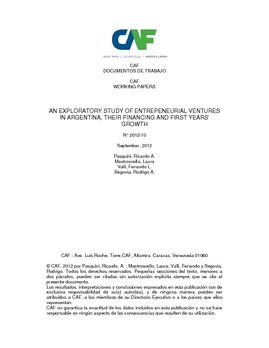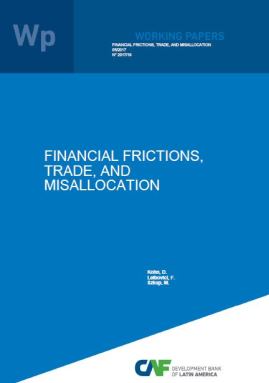An exploratory study of entrepeneurial ventures in Argentina, their financing and first years' growth
Resumen
This is a study of entrepreneurial ventures in Argentina, in particular regarding their finance and growth in their early years. We sample young manufacturing SMEs (i.e., with an average of six years and a maximum of ten years old), and interview their founding partners. The entrepreneurs reported on how their ventures were financed during the startup and subsequent years of operations. We first examine the financing structure, how it changed in the first five years, the degree of similarity of financing structures across ventures, and the feasibility of access to alternative sources as reported by the founding partners. We then focus on the determinants of venture’s growth, and for this purpose we econometrically test the effects on employment growth of several characteristics of the venture -including the startup financing structure- and of their founding partners, notably including a set of psychological traits. We find that financing structures at startup are highly and near exclusively concentrated on owners’ equity, accounting for approximately 80% of total financing. Outsiders’ debt -including bank and non-bank sources- reach 10% of total financing. Outsiders’ equity accounts for a higher percentage and is actually perceived as more feasible than bank lending. After the first five years of operations, the financing structure concentrates even more in owners´ equity and, although there is an improvement in the perceived feasibility of access to bank lending as reported by entrepreneurs, this is not translated into a higher participation in bank financing as percentage of total financing. In relation to growth results, we find some evidence that those entrepreneurs that also own or partner in other businesses, and those firms with a higher number of partners explain a higher employment growth rate. No effects are found for initial financing structure variables. In terms of psychological traits, and with some exceptions –a weak evidence on negative effects of risk aversion and positive effects for the Self-Efficacy Trait- we find that the factors that in the literature are seen to explain entrepreneurial career choice are not corroborated here as determinants of growth.
Materia
País / Región
Fecha
2012Citar de esta publicación
Item perteneciente a la Colección
Autor
Pasquini, RicardoMastroscello, Laura
Valli, Fenando
Segovia, Rodrigo
Items Relacionados
Financial Frictions, Trade, and Misallocation
We investigate the extent to which financial frictions shape the aggregate effects of a trade liberalization through their impact on aggregate total ...
Blue BioTrade: Harnessing Marine Trade to Support Ecological Sustainability and Economic Equity
The following report describes how the application of the Blue BioTrade concept can promote sustainable and equitable economic sectors and value chains ...
Annual Report 2005
In 2005, Latin America once again exhibited a positive macroeconomic performance, partially as a result of favorable international conditions and the ...






